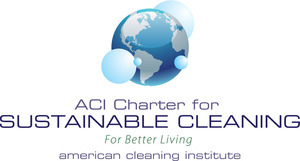I do hope you recently read my Tecnon OrbiChem colleague, Philippa Davies’ recent article on the impact of low crude oil price on bio-based chemicals projects, with insights taken from her attendance this week at the ICDC Downstream Chemical Conference in India, which was jointly organized by Tecnon OrbiChem and Elite++.
As for me, I am wrapping up my meetings and networking at the American Cleaning Institute in Orlando. Check out my latest tweets via @Dgreenblogger under #ACI2015. It has been four years since I attended this convention and from what I’ve heard this year, attendance is record-high so I guess the cleaning industry is doing pretty well.
According to this morning’s convention updates, the mood in the cleaning and home care sector is upbeat and more than 900 attendees are present from companies and organizations all over the world. Sustainability is also a hot topic here and it has to be I guess since cleaning products are directly used by consumers.
 The ACI’s Charter for Sustainable Cleaning, a voluntary initiative to promote and demonstrate continual improvement in the industry’s sustainability profile, currently has 25 member companies, and they have to formally commit to the ACI Principles for Sustainability, must participate in ACI’s Sustainability Metrics Program, and work toward implementing a set of Essential Sustainability Procedures and Activities (SPAs).
The ACI’s Charter for Sustainable Cleaning, a voluntary initiative to promote and demonstrate continual improvement in the industry’s sustainability profile, currently has 25 member companies, and they have to formally commit to the ACI Principles for Sustainability, must participate in ACI’s Sustainability Metrics Program, and work toward implementing a set of Essential Sustainability Procedures and Activities (SPAs).
Charter participants must commit to having systems in place for continual assessment review and improvement of sustainability performance at every stage of their products’ lifecycle. The 2014 Charter Members include AkzoNobel, Amway, Arylessence, BASF, Chemia Corporation, Church & Dwight, Clorox, Colgate-Palmolive, Croda, Dow Chemical, DuPont Industrial Biosciences, Ecolab, Evonik, Firmenich, GOJO Industries, Henkel Consumer Goods, Huntsman, International Flavors & Fragrances, Novozymes, P&G, Sasol, SC Johnson, Seventh Generation, Shell Chemical and Stepan.
The ACI Charter is based in part on the AISE Charter for Sustainable Cleaning, a voluntary initiative of the European soaps, detergents and maintenance products industry.
One of the programs that ACI has been successfully working on for the past several years now is partnering with “Clean The World” organization, which collects and recycles discarded soaps, shampoos, conditioners and other hygiene products from more than 1,982 hotels and 493,395 guest rooms (numbers as of 2013), which are then distributed to areas where cleaning products essentials are not readily available.
In the US, more than 2 million bars of partially used hotel soap are thrown away everyday in the US.
It was actually cool to hear at the conference that India’s home and personal care industry association, IHPCIA, has the same initiative called “Cleaning for a purpose” program, where soap are recycled and repackaged from hotels for distribution to school children via NGO partners. Around 250 tons of used soap have already been reprocessed and recycled under the program.

The home care industry in India is estimated at $3.8 bn, which is a huge volume-driven market.
In Asia, the Clean The World organization was able to collect and recycle around 30 tons of used soap last and manufactured 150,000 recycled soap bars last year. Outbound donations included more than 40,000 bars of recycled soap and 5,000 ONE Project hygiene kits in Hong Kong and Macau. Clean the World Asia also donated 45,000 bars of recycled soap and 15,000 hygiene kits in the Philippines.



